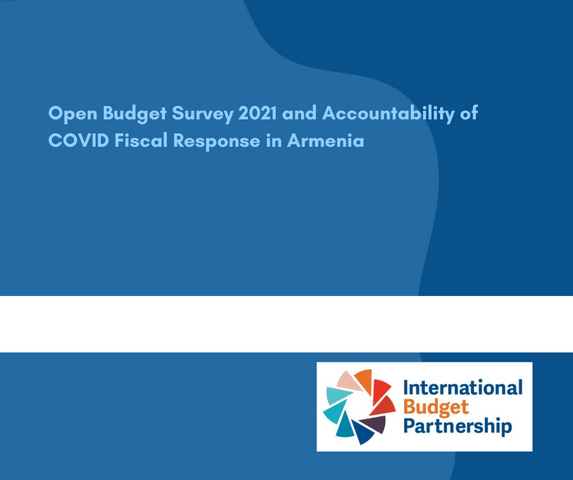Open Budget Survey 2021 and Accountability of COVID Fiscal Response in Armenia
The project consists of two closely related to each other components: Open Budget Survey (OBS) 2021 and Accountability of COVID Fiscal Response in Armenia. The major goal of the first component, OBS 2021, is, using internationally accepted criteria, to assess public access to central government budget information; formal opportunities for the public to participate in the national budget process; and the role of budget oversight institutions, such as legislatures and national audit offices, in the budget process. The outcome of the assessment will be the Open Budget Index (OBI) for Armenia for 2021. OBI is a set of three indices – indices of budget transparency, public participation in the budgetary processes, and budget oversight. This will be the 8th edition of the OBS (the first edition was in 2006) and will cover 120 countries. Armenia will be involved in the survey for the first time. After the release of the OBS 2021 results, findings and recommendations based on them, advocacy efforts will be carried out to implement those recommendations.
Similar to the first component, this component, Accountability of COVID Fiscal Response in Armenia, is also a global project of IBP to be conducted in 120 countries (including Armenia) in partnership with local CSOs. It analyzes how the governments managed their initial COVID-19 fiscal policy responses and, based on that analysis, generate lessons on how they can respond better, both to the ongoing COVID-19 crisis and to future ones. The measures to be analyzed are those, which were taken during the time period from the adoption of the first such measure (in Armenia it was at the end of March 2020) to September 30, 2020. This assessment of emergency fiscal policy packages – sets of policy initiatives aimed at addressing the impact of the COVID19 emergency – will focus on three critical pillars of accountability: public access to relevant information, adequate oversight arrangements, and opportunities for citizen engagement. Here also, after the release of the results of analysis, advocacy efforts will be carried out to implement recommendations stemming from those results.


